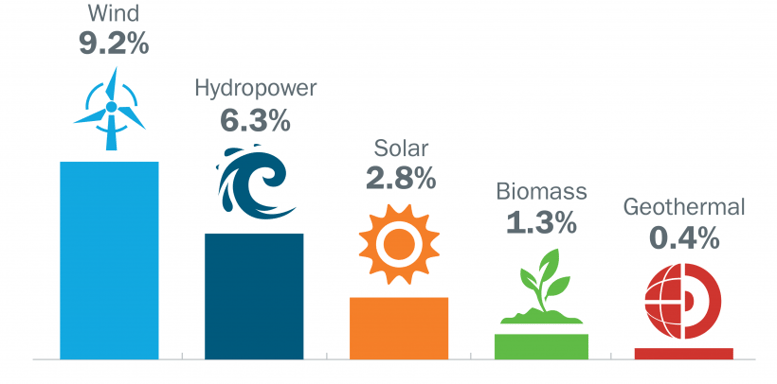According to the Department of Energy, 20% of all U.S. electricity is currently generated by renewable sources, with resources available to provide 100 times the nation’s annual electricity demands. So it’s not surprising at all that the US Energy Information Administration says that almost half of all electricity sources being developed are coming from solar power.
As a Houston-based agency, in the very heart of the oil and gas industry in the US, we know oil and gas and have supported the marketing goals of our O&G clients since our agency opened its door over a decade ago. From software to services, upstream to downstream, we know and love our local industry. But the oil and gas industry has begun a transition to renewable and green energy sources in response to several factors, including growing environmental concerns, changing market dynamics, and evolving regulatory policies. In this article, we’ll explore some of the changes occurring in the energy industry and how that impacts marketing for O&G and green energy operators.
What is Renewable Energy?
Renewable energy, often referred to as clean energy or green energy, is energy that is derived from sources that are naturally replenished and virtually inexhaustible over human timescales. Unlike fossil fuels (such as coal, oil, and natural gas), which are finite and contribute to environmental pollution and climate change, renewable energy sources offer a more sustainable and environmentally friendly way to meet our energy needs. The primary sources of renewable energy include solar energy, wind energy, geothermal energy, hydropower energy, biomass energy and battery storage.

SOURCE: Energy.gov - Shares of total electricity production in 2021 among the types of renewable power
What are the benefits of renewable energy?
Many are interested in developing renewable energy because of the advantages these sources offer. Following we will discuss a few of the key benefits offered by green energy sources.
Environmental
Most people would probably cite environmental benefits as the top reason for considering development of clean energy. Renewable energy producers create little to no greenhouse gas emissions, air pollutants, or toxic waste, making them significantly cleaner and more environmentally friendly than fossil fuels.
Sustainability
Renewable energy sources also have the benefit of being sustainable, meaning these energy sources are naturally replenished and, in most cases, do not deplete over time. This makes them a sustainable long-term energy solution.
Energy Independence and Stability
As a resource-rich country with abundant renewable energy resources, shifting to renewable energy would also provide the United States with energy independence, reducing our dependence on fossil fuel imports and enhancing our energy security. As an added benefit, this diversification of our energy mix also reduces our vulnerability to price fluctuations and supply disruptions in the fossil fuel market.
Evolution of the energy industry
As the world grapples with climate change and seeks to reduce greenhouse gas emissions, there is a growing emphasis on transitioning to renewable energy sources as a way to mitigate the environmental impact of energy production and consumption. For oil and gas companies, this transition has taken many forms.
Investment, Partnership and Acquisition
Many major oil and gas companies have started investing in renewable energy projects, including wind, solar, and biofuels. They see renewable energy as a way to diversify their energy portfolios and reduce their carbon footprint. Oil and gas companies have also worked to acquire or partner with renewable energy companies to gain expertise and access to established green energy technologies. This helps them enter the renewable energy market more quickly and effectively.
Implementing Cleaner Practices
Traditional oil and gas operations are also working to reduce their emissions by implementing cleaner technologies and practices. This includes carbon capture and storage (CCS) technologies to capture and store emissions, as well as more efficient drilling and extraction processes. Additionally, O&G companies are focusing on improving the energy efficiency of their operations. This includes optimizing transportation, refining, and production processes to reduce energy consumption and environmental impact.
Commitment to a Cleaner Future
To attract investors and meet stakeholder expectations, many oil and gas companies are making ESG commitments. These commitments include reducing carbon emissions, investing in renewable energy, and increasing transparency regarding environmental practices. Some oil and gas companies are also developing carbon offset programs to mitigate their emissions. They invest in reforestation, conservation, and renewable energy projects to compensate for their carbon emissions.
Traditional operators have also begun investing in research and development of new technologies, such as advanced battery storage systems and alternative fuels, to reduce their environmental impact and prepare for the future.
In summary, government policies, incentives, and global efforts to reduce reliance on fossil fuels and move toward a more sustainable and cleaner energy future all work to support oil and gas companies in making this transition.
what does this mean for marketing in the energy industry?
Diversifying and shifting to an increased focus on renewable energy for a traditional oil and gas operator can require some adjustments in their marketing strategy as well.
Educate Prospects and Emphasize Benefits
Because traditional fossil fuels have been around for the entirety of our lifetimes, a traditional oil and gas company will need to be sensitive to new entrants to the energy industry and offer meaningful content to help educate newcomers who may not be familiar with their offerings. Though consumers and businesses may not fully understand the technology or the environmental impact of green energy solutions, marketing campaigns should focus on educating the target audience about improvements they will realize with renewable energy.
Be a Thought Leader and Advocate
The green energy sector is heavily influenced by government policies, incentives, and regulations. Because of this, marketing efforts must stay informed about these policies and advocate for favorable changes when necessary. Marketing for clean energy companies can include elements of advocacy and thought leadership, by taking a stand on environmental issues, promoting the adoption of renewable energy on a broader scale, and engaging with the public and policymakers.
Be Transparent
Because of the heavy regulation of renewable energy development, renewable energy operators are often held to high standards regarding their environmental practices. Marketing should reflect these practices and demonstrate a commitment to transparency and sustainability. These companies should regularly report on their environmental impact and sustainability efforts and utilize these reports in marketing materials to showcase the company's commitment to transparency and continuous improvement.
Ensure Value Alignment with Prospects
Marketing green energy companies should appeal to prospects who prioritize sustainability and environmental responsibility. Messages should align with the values and lifestyles of the target audience, fostering an emotional connection. Marketing in the renewable energy space is not just about selling a product or service; it's about building long-term relationships with customers. This is especially true for clients who may be making substantial commitments to renewable energy sources.
Conclusion
Though the clean energy sector will most certainly continue to evolve as it grows, marketing for renewable energy operators will require a unique combination of environmental consciousness, education, policy awareness, and alignment with the values of environmentally conscious clients and investors. It's about more than just selling a product; it's about promoting a sustainable and environmentally responsible way of life.
If you’re a traditional oil and gas operator who is diversifying into renewable energy or a new entrant into the energy sector, Bonafide would love to talk with you about how HubSpot can support your marketing efforts. Read reviews from our satisfied clients here.


